The story of Dante and the circle of hell he reserved for certain politicians
Seven hundred years after his death, Dante’s ‘Divine Comedy’ still rings true, especially where certain politicians are concerned. Kevin Childs traces the story behind the epic poem and why it’s relevant today

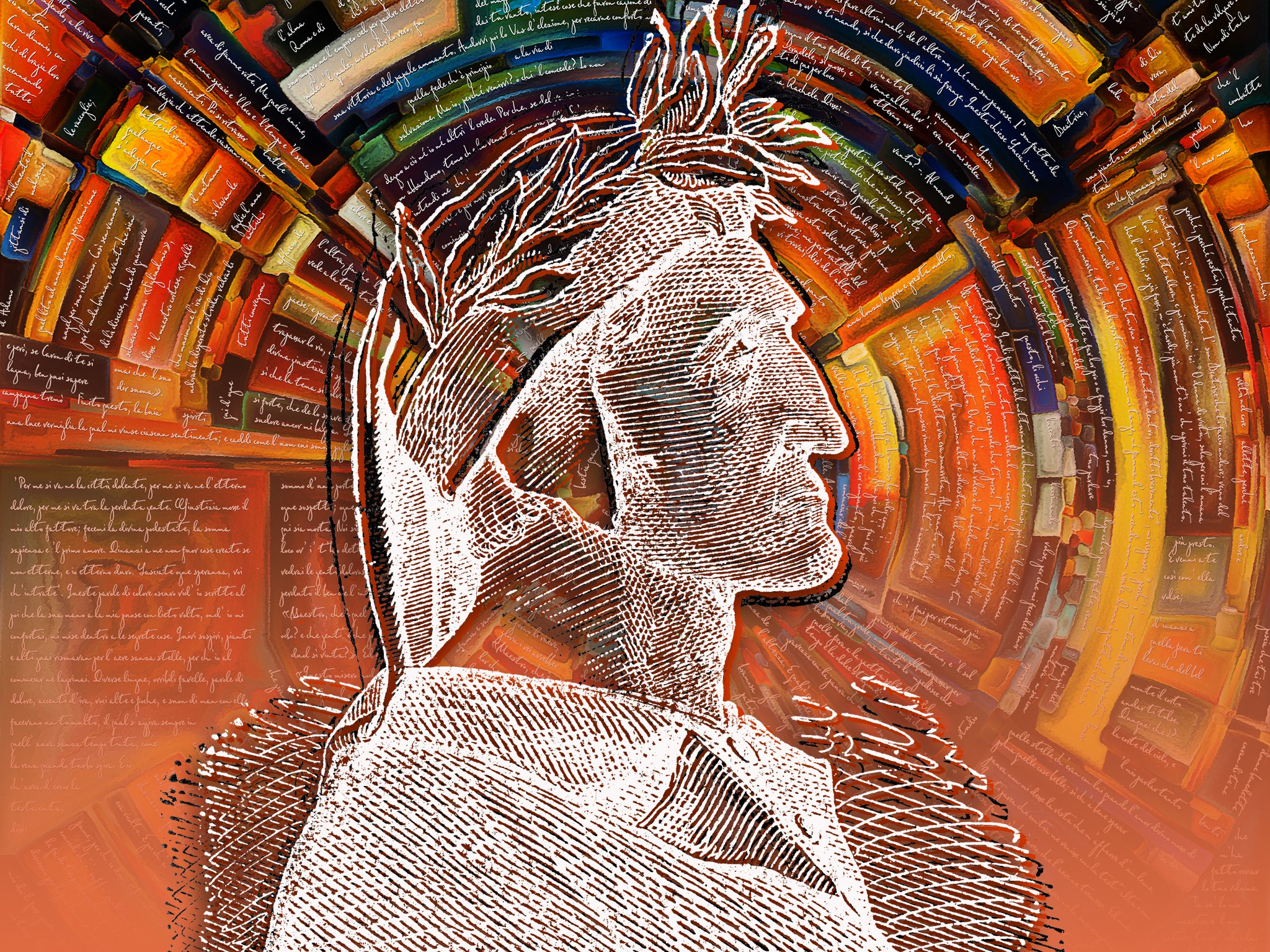
It’s been more than 700 years since its creation, but there really is a circle of hell reserved for certain politicians. When the Italian poet, Dante Alighieri, envisioned that ring, he prophesied the demise and damnation of all those who’ve tried to break the peace and harmony of Europe across the ages. He gave us a universal system for judging them and an alternative view which, seen in a particular way, seems shockingly modern.
In his greatest work, the epic poem Divine Comedy, Dante not only defines the topography of this place for generations to come, he confines to the deepest trenches of hell the liars and promise-breakers, the traitors and kleptocrats, anyone who saw political and financial opportunities in sowing discord and fomenting disunity. Anyone who thought conflict was preferable to peace. If it were written now, it would be obvious who’d be there. You know who you are. We know who you are, and the remarkable thing about Dante’s magnificent poem is that he’s done it all for us. You could swap a few names, but the crimes and the punishments would be the same.
When Dante died in September 1321 – 700 years ago – he’d just completed the work for which he is most remembered. The Divine Comedy has since been read and re-read, translated and learned by heart. Michelangelo Buonarroti is said to have had every word of it by rote. Its visions of heaven and hell have entered our subconscious. Its tales of tragedy, horror, triumph and bliss – little poems within the longer poem – have inspired other writers, painters and composers for centuries. And Dante’s language, Tuscan, would become the basis of the official modern Italian language. Few writers have had quite the range and depth of influence on others as Dante.
But what can Dante teach us today, in a world where no hell lies beneath the Earth’s crust and heaven is a vacuum, its stars great balls of burning gases flying inexorably away from each other to no godly purpose and for no divine end? Well, quite a lot, I think. You can read the Divine Comedy as an exposition of medieval theological thought, but it is so much more than that. Sometimes it seems that all life, every thought or feeling, every joy or mishap, every heartbeat that ever throbbed is there to be found among its verses.
Dante was a poet, a philosopher, a politician, a mystic. He was funny and angry, brilliant and cantankerous, and so powerful was his pen, so vivid his imagination, he could consign anyone to the deepest pit of hell or the highest sphere of heaven for all eternity, or at least for as long as words are intelligible and books are read.
New life
Dante was born in May or June 1265 to a family of Florentine bankers. He was christened with the name Durante Alighieri, which means “enduring bearing wings”. It was always shortened to Dante. Both his parents were from prominent Guelph families, the faction in Italian politics of the time which traditionally supported the Pope in successive conflicts with the Holy Roman Empire. They were merchants, bankers, prosperous traders who saw no reason why they shouldn’t grasp the reins of power as much as the old, landed aristocracy.
By the time he was 30, that old aristocratic and pro-imperial faction, known as Ghibellines, had been defeated at the Battle of Campaldino in June 1289. Dante, only 24 years old then, was eager to make an impression. He fought in the Guelph cavalry, describing later how his fear had turned to thrilling exultation when the cavalry was able to rally and counter-attack. It is said that so many Ghibellines were killed, human remains were still being ploughed up on the field less than a 100 years ago.
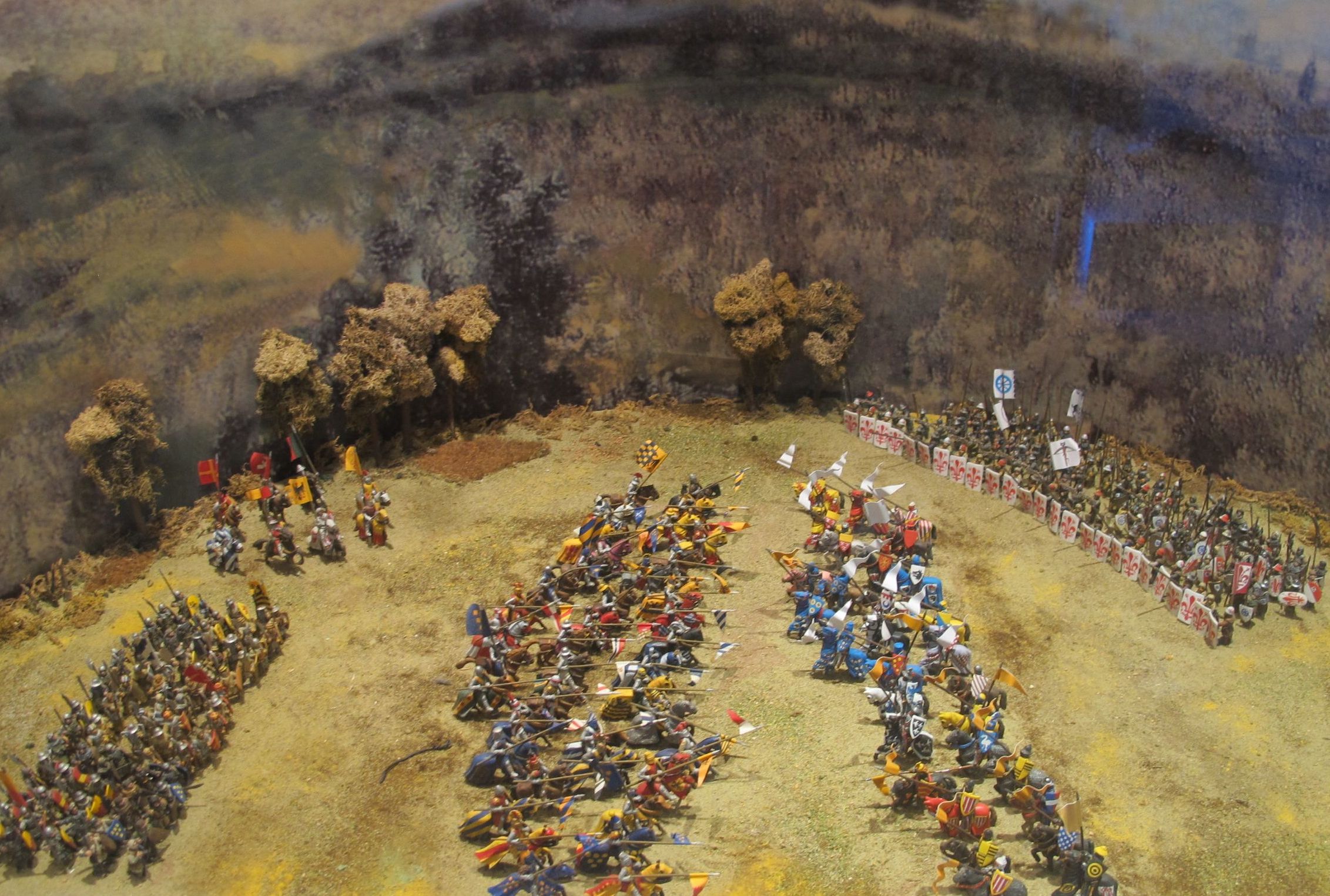
Dante encounters one of those Ghibelline dead, a man called Buonacorso da Montefeltro, on the slopes of purgatory in the Divine Comedy. He wonders what could have happened to Buonacorso’s body, which had never been found. It was swept away by a torrent, he’s told, but as his sight failed him, the Ghibelline knight uttered one word, “Mary”, enough, it seems, to deny the devil and give him the opportunity to climb the long rode to paradise. The experience of this battle clearly had a profound effect on the poet. Some have even speculated that it was Dante’s lance or sword that had killed Buonacorso and that he’d hunted for his body afterwards to give it a decent burial. Brother killed brother that day, and the tragedy is that it’s only through this means, through victory that peace was made possible. There had to be another way. The course of the Divine Comedy shows that way.
The earliest portrait we have of Dante can be found in the little chapel in the Bargello Museum in Florence, once the headquarters of the Podesta, or chief of police. The chapel is dedicated to Saint Mary Magdalene and was used for the blessing of condemned men and women before their executions. In the frescoes depicting visions of hell and paradise, among the elect stands a youngish looking man with the distinctive profile, the hawkish nose, the proto-lantern jaw and deep-set eyes we can recognise as Dante’s from contemporary descriptions. There’s some consensus that it was painted in the early 1330s by Giotto, a friend of Dante in the latter part of his life, or maybe his workshop. The artist has given the poet back his youth and shown him among the great and good of Florence at a time when he was still flying high in the worlds of poetry and politics.
But long before that, when Dante was a child of nine or 10, he met a girl of about a year younger who would come to haunt his thoughts and imagination for the rest of his life. On May Day, 1274, young Dante went with his father to the house of a prominent Florentine banker, Folco Portinari, to visit one of his friends. Amid the flowers and festivities, the songs and dancing, he there first laid eyes on the girl:
At that moment, and what I say is true, the vital spirit, the one that dwells in the most secret chamber of the heart, began to tremble so violently that even the least pulses of my body were strangely affected.
She was Beatrice Portinari, one of the banker’s daughters. She must have been beautiful. She carried herself with an ease and grace that captivated everyone. He would later write of these early encounters with Beatrice in his first major book, Vita Nuova or New Life, a remarkably modern work, full of self-analysis which examines in detail the sensations, thoughts and feelings of a young man who has found himself fallen deeply, profoundly, painfully, and exquisitely in love. As a manifesto, it places Dante firmly in the camp of peace and love, where he would remain, as best he could, for the rest of his life.
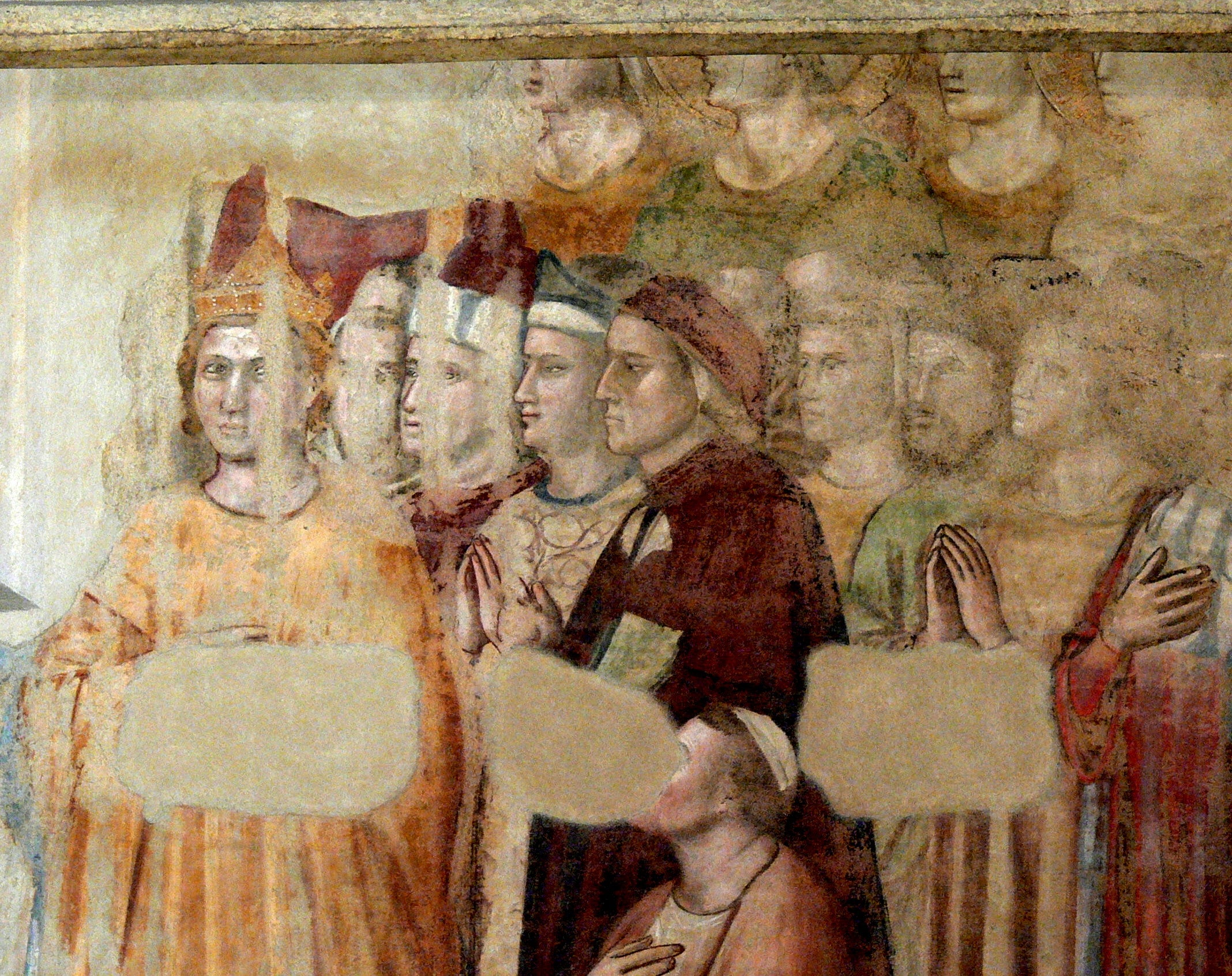
Beatrice and her fledgling admirer met only a few times; the second time was nine years after this first encounter, when he was 18 and she 17. Then hormones played their part. He was so overcome with emotion he couldn’t speak. But Beatrice smiled at him in a street in Florence as if in recognition and he went away to his room where, falling into a fitful sleep, he had a troubling dream:
In one hand my heart, while in his arms there slept
My lady and all about her folding
A bright veil. He woke her, and gave my scalding
Heart to her to eat, then suddenly I wept
As they flew up into the air, my eyes beholding.
This odd, cannibalistic end to his vision clearly freaked the young poet out. He decided he needed to hide his passionate love by latching on to what they called in those days a love decoy, another woman who acted, entirely out of ignorance, as a sort of surrogate girlfriend. The plan backfired, because the next time Beatrice and he met she completely ignored him because she’d heard he’d been paying court to another. A little later at a wedding she was seen laughing at his consternation when his heart began to pound painfully and his senses all but left him leaning against a painted wall, trembling and half blind at the sight of her.
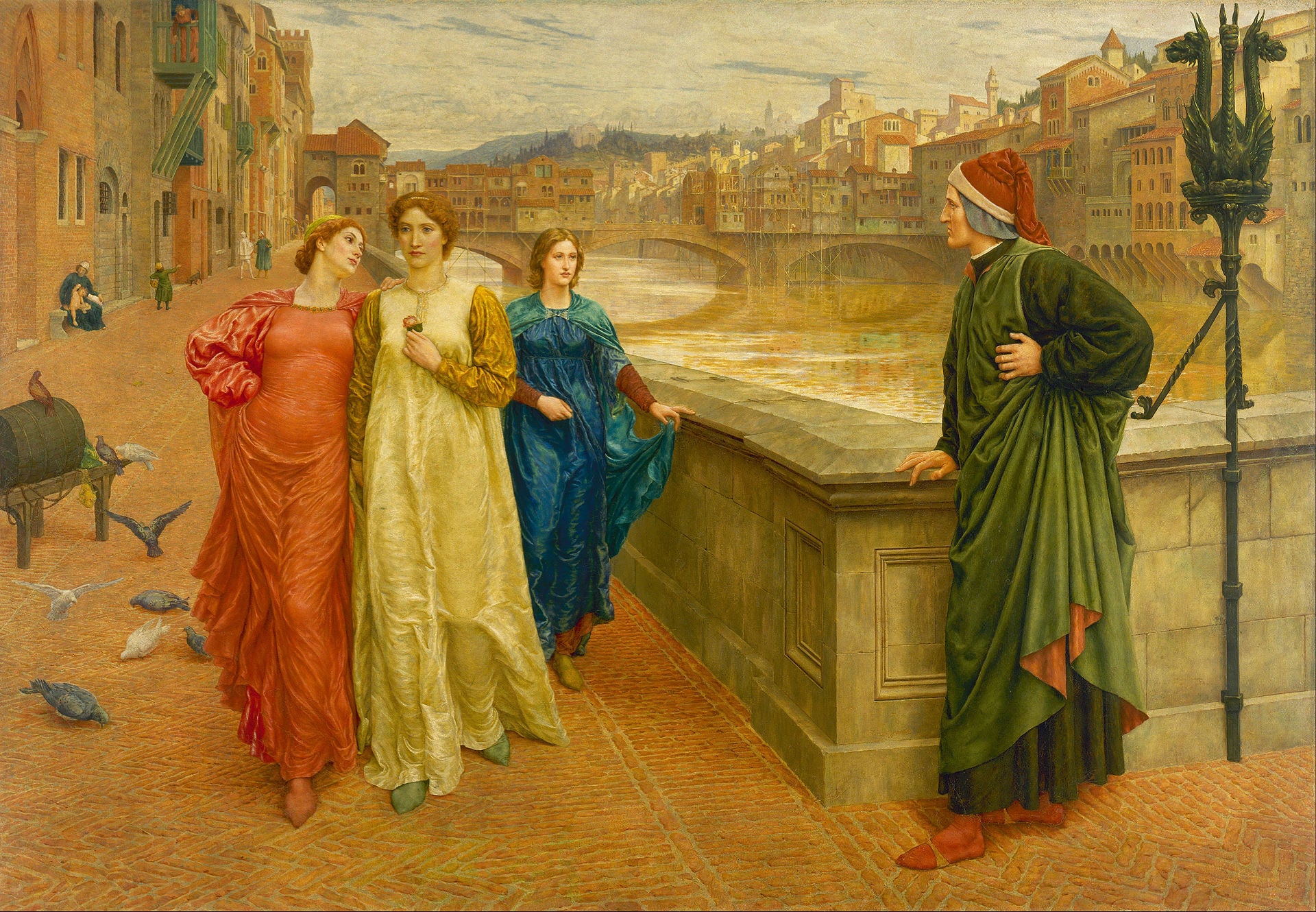
Dante’s mother and father had both died before the mortifying revelation of Beatrice’s contempt, leaving him an orphan in his mid-teens. But as if released from the confines of a bourgeois oligarch’s existence, it’s then that his true adventures began, and his poetic voice first emerged. A kind Florentine scholar and statesman, Brunetto Latini, became a sort of surrogate father, encouraging the youth in his studies and introducing him to Roman authors such as Cicero and Statius and, of course, Virgil, who would purchase such a hold on his imagination.
Young Dante joined a circle of writers who met in the house of Guido Cavalcanti, one of the most important vernacular poets of the 13th-century, whose verse, inspired in part by the songs of provencal troubadours and partly by classical poets such as Ovid, typified what became known as the “dolce stil nuovo” or “new sweet style” of poetry in the Tuscan tongue. In his early work, Dante would enthusiastically embrace this style, and Cavalcanti would become his mentor and most sensitive critic:
About the state of my broken heart,
But Love came to me as if in his shroud
And said, “Don’t send them, I’m warning you,
For if it’s the man I think it is
His mind won’t be yet shrewd enough
To hear of all the injustices
With which I make you burn.
Under this tutelage, and with the encouragement of other poetical friends, Dante ventured on that first book, Vita Nuova. But events had already overtaken him once more, a pattern for his life it seems. On 9 June 1290, Beatrice Portinari died, just six months after her beloved father. She had been inconsolable over her father, as the poet records in his book, but it was Dante’s turn now.
Catastrophe
By the time she died, both Beatrice and Dante were married to other people, but that was hardly the point. The poetry of the dolce stil nuovo was irrigated by that same source as the songs of the troubadours: courtly love, a not always chaste desire and longing for someone other than the poet’s spouse, which also prompted the stories of Lancelot and Guinevere, Tristan and Isolda, Gawain and the Green Knight. In Dante’s case it seemed to have bordered on obsession, for he came very close to a severe breakdown when she died, writing a long canzone describing his inconsolable grief and then bidding it farewell as if he might never write again:
Find out those lovelorn, lovely ladies
To whom your poetical peers
Would in times past bring only joy;
But you, the daughter of such miseries,
Make your disconsolate way and come no more.
We don’t know the state of his marriage at this time. His wife, Gemma Donati, came from another prominent Guelph family. Giovanni Boccaccio, who wrote an early biography of his fellow Florentine, speculated that it was not a happy one, and Gemma’s cousin, Corso Donati, would become the poet’s political nemesis. But after two children born in the late 1280s, another two – a son Jacopo and a daughter Antonia – around 1300, it could be suggested that some sort of conjugal harmony existed. By then the poet had entered the fractious, in fact down-right dangerous world of Florentine politics.
The consonance between late 13th-century Italy and now are uncanny. After the defeat of the Ghibellines, the Guelph party itself had split into two opposing factions, the constitutionally minded “Whites”, who wanted to build bridges and live in peace with their neighbours, and the more militant “Blacks”, who seemed to thrive on discord. The political echoes become deafening when we consider that for much of the 1290s the Whites, Dante’s own party, was in power. But after a wide-ranging conspiracy, which included the Pope, Boniface VIII, the brother of the King of France, Charles de Valois and the exiled leader of the Blacks, Corso Donati, a coup overthrew the government of which Dante was a part and plunged Florence into years of chaos. The Blacks and their French allies began to pillage the homes of their opponents, settling scores, murdering citizens in the streets and burning down the houses of prominent Whites. Dante’s own house – which so many students and visitors to Florence hunt for among the old alleys these days – was ransacked and his property confiscated. A new government was proclaimed, and scores of Whites were exiled.
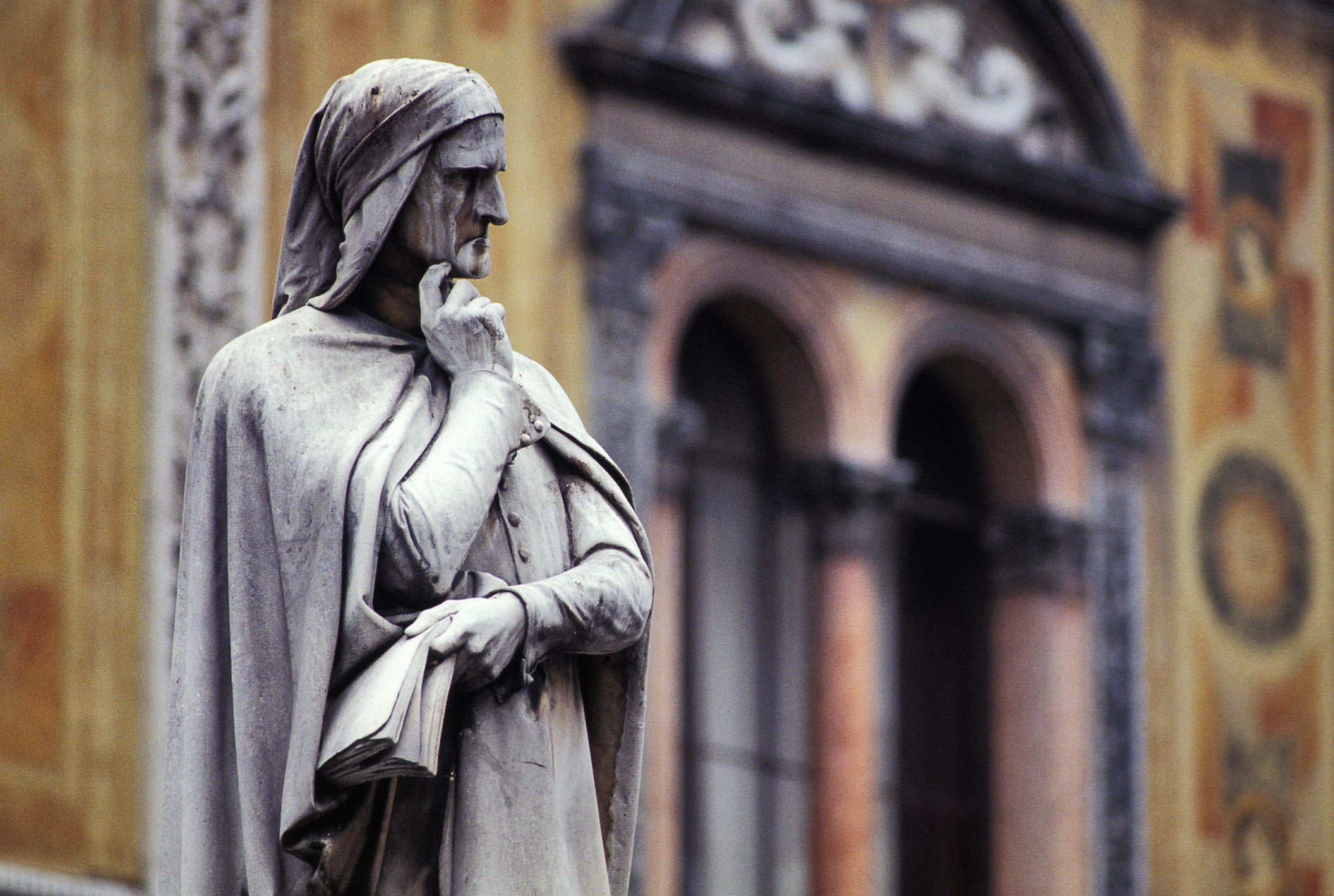
Dante, who had been on a foolhardy embassy to the Pope in Rome when the coup started, learned that he’d been condemned for corruption, almost certainly unjustly, and sentenced to two years exile and an eye-wateringly large fine. He knew he could never pay the fine as all his property had been seized by the new government. In the absence of a reprieve, those two years would stretch into a lifetime. To return to Florence without paying the fine would have meant execution.
The poet in exile
Dante began to travel from one place to another. In 1304 he found himself in Bologna, among the scholars of the university, breaking bread with old friends from Florence, fellow exiles. It was a congenial place, but he was in dire need of money and began to write feverishly, lectures on the suitability of the vernacular language in literature as opposed to Latin, a long, encyclopaedia-like discourse on everything he could think of which he called Il Convivio or The Banquet, written in elegant Tuscan poetry and prose.
In dealing with the idea of nobility, for example, he scorns those who believe that it is somehow derived from ancestral wealth, the acquisition of which is prompted by mere avarice. Such wealth is theft, and there’s no honour among thieves. The very laws that scholars all around him were studying had to be invented, after all, to counter theft. But across Italy, and in Florence especially, such laws held no sway or were simply brushed aside in the scrabble for money and power and the desire to please plutocratic magnates such as the Pope. Grasping politicians breaking laws and kowtowing to gigantically wealthy opinion setters in a sort of moral free-for-all, there’s nothing new it seems.
Hell
Dante, however, was already contemplating something far grander than Il Convivio. Dante the poet, who for several years had been very much playing second fiddle to Dante the scholar and Dante the philosopher, was about to reemerge from his long hibernation.
I found myself in a dark wood
In which the true path was lost…
So begins the Divine Comedy, one of the most remarkable and sustained pieces of brilliant poetical writing ever created. Its narrative arc, its sense of timing and dramatic tension, its mingling of vulgar and high-flown language, comic and tragic episodes to highlight that tension, its invention of a new poetic form, terza rima or triple rhyme, to drive that narrative forward swiftly and succinctly, its distillation of memory, story, theology and philosophy makes for a comparison with the Bible, the Iliad, the Ramayana of India or the Journey to the West of Chinese literature. It’s written in three books, each book divided into 33 chapters known as “cantos”. All life is here, and he would work on it for what was left of his, never returning to Florence, always moving from one place to another, hoping to find a means of living, growing old prematurely, sometimes bitter, often sublime in his sense of love and cruel in his desire for revenge.
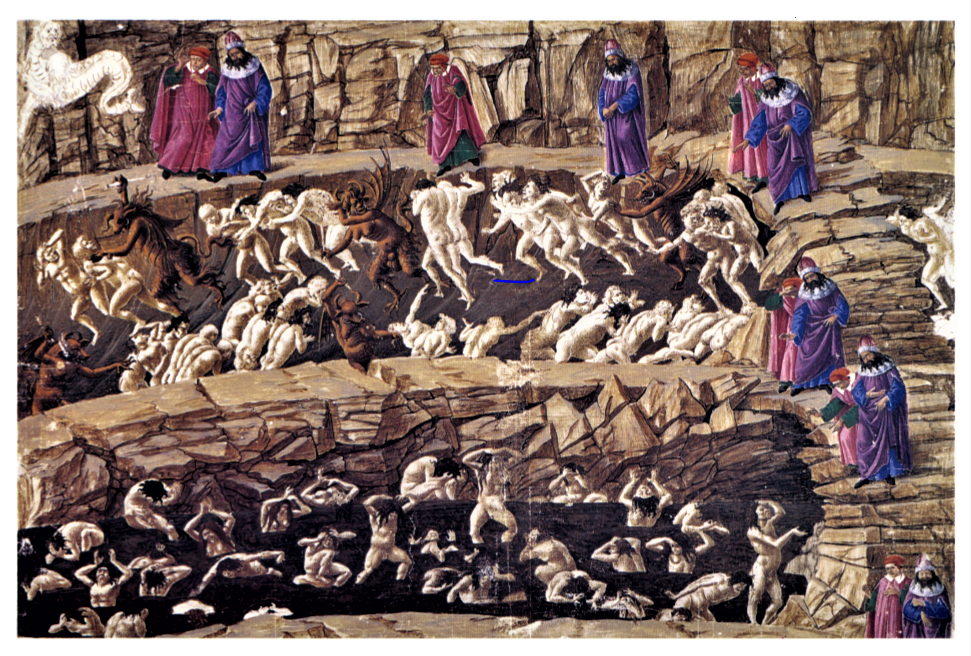
Originally titled simply Commedia, the poem’s themes couldn’t be considered tragic overall and so the opposite, comedy, which didn’t necessarily denote something funny or witty then, seemed appropriate. The “Divine” epithet was added by Boccaccio when he edited the work, as suitable to its grand themes. It follows a fictionalised Dante on a journey over the Easter period, specifically the Easter of 1300 and therefore just before Dante’s exile. The poet passes through the regions of hell, purgatory and heaven. He settles old scores, makes succinct prophecies and spins sublime visions from his imagination. Our picture of hell, with its ever narrower, ever deeper consecutive circles, comes from the Inferno. Purgatory as a steep mountain fraught with dangers is popularised by Dante, and paradise is a sort of ecstatic vision of a rose at the very centre of which is an image of perfection he cannot translate into language:
Love of truth, filled with delight,
Delight which transcends all sweetness.
All of this may make it sound very Medieval, and of course it is. Dante believed in the Christian God, he trusted in salvation because he knew of original sin. But substitute God with the right side of history, salvation with universal peace and original sin with greed, and the Comedy is also a vast political tool, the purpose of which is to promote a particular point of view and damn all those who disagree with it. That peace and happiness could only come through cooperation between states and that the means to achieve this cooperation was through due respect for laws, particularly on an international level. Greed and corruption have no part in this and must be cast into the infernal regions.
As he stumbles about the dark wood, terrified by wild beasts, Dante’s path is blocked by a vicious, ravenous wolf. This is avarice, this is political expediency, this is the Rome of Boniface and all the treacherous, murderous cheats who were tearing Italy apart. Turning back down the path by which he’d come, he notices what he takes to be a man shadowing him and calls out to him for help. The other tells him he has been sent to guide him onto the right path, but to avoid the wolf they must first go down into the bowels of the earth and travel through the regions of the underworld. This other man, it transpires, is the Roman poet Virgil, author of The Aeneid, the great epic of Roman origin and still one of the most read books of the ancient world. Virgil is a fitting guide for an epic poet, who had visited the dark kingdom of the dead himself – in his imagination at least – and who was already one of Dante’s most precious influences. He has been sent, Virgil says, by a divine spirit, someone who knew and loved Dante while on earth and who will guide him through paradise at the end of his journey. And so Beatrice Portinari, now a heavenly host, reenters Dante’s story.
Over the following cantos, Dante encounters horror, humour and sympathy. At the gates of hell, he finds written one of the most famous expressions in all literature:
Through me you go to eternal fear.
Through me are souls with no tomorrows…
Abandon hope all who enter here.
No doubt prompted by the presence of Virgil, Christian and pagan traditions of the underworld mix. Dante, a living human, is ferried across the River Acheron by the infernal boatman Charon, just as Orpheus and Aeneas had been. He watches judgement meted out by the ancient Greek king Midas, tasked with deciding which level of hell each condemned soul should be sent to. In the region of Limbo he encounters the souls of all those who, like Virgil himself, led good lives but died without the knowledge of Christ. Their eternity is not one of torment but of regret and sighs. They feel no pain, they tremble with no joy either. They are the politically homeless who inhabit a sort of democratic nowhere, those who stood by, those reluctant fellow-travellers and regretful self-servers.
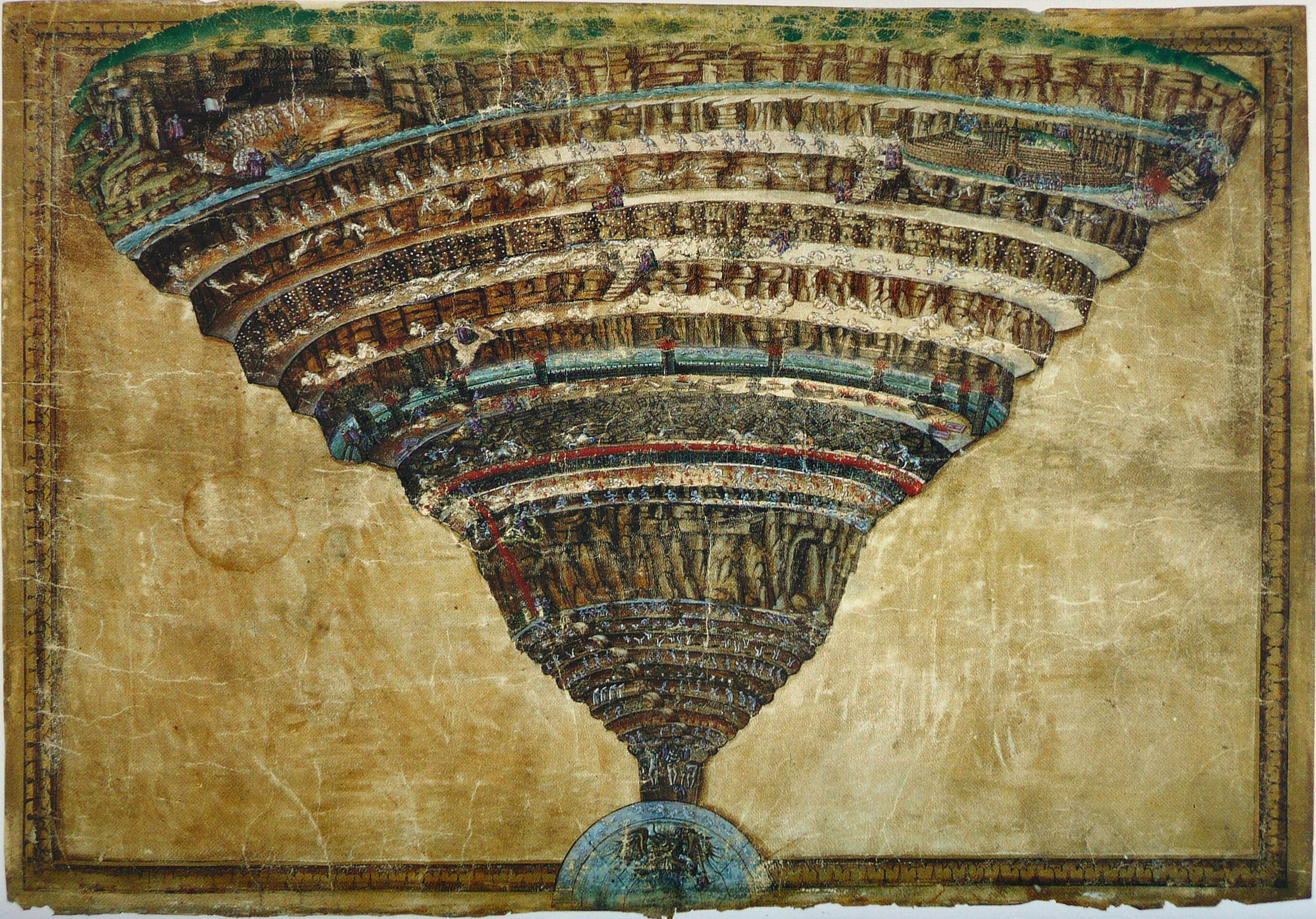
In his journey through the horrors of the other eight circles of hell Dante encounters old friends and old enemies. Most of the damned appear as naked bodies, sometimes hideously disfigured or burned, emaciated or bloated, as if to reinforce the very physical nature of their torments and the grotesque nature of their crimes, forgetting for a moment that these are disembodied spirits. Few of their names mean anything to us now. But then, who will remember today’s often criticised politicians Boris Johnson or Michael Gove, Theresa May or Jeremy Corbyn 700 years from now? Unless someone writes their own Comedy, but then why bother when Dante’s already done it? Substitute the name of Filippo Argenti, an arrogant political fixer condemned to wallow in the filthy mire of the wrathful, with the names of any number of modern-day politicians and the job’s done. Or think of Pope Boniface as a sort of media baron, or the treacherous Ubaldini, who starves Count Ugolino and his sons and grandsons to death for political gain in one of the most heart-wrenching episodes of Inferno, as any government minister responsible for taking food from the mouths of children and docking universal credit.
Some of these encounters in hell reflect Dante’s own life. Brunetto Latini, the kindly scholar who’d taken him under his wing when his father died, has fallen among the “sodomites”, presumably having died an inveterate lover of men. Dante has no judgement for him, however, only sadness and compassion. “Is it you here, Brunetto?” He asks.
… you would not yet remain
Banished from your place in human nature.
The father of Dante’s friend Guido Cavalcanti, widely believed to have been an atheist and therefore permanently entombed in fire, asks the poet why his son isn’t there with him, prompting Dante to remark “you souls in hell, it seems, can see the future but are confused by the present”. For in the timescale of the Divine Comedy, Guido is still alive but soon to be exiled himself in an attempt by the White government to stem the tide of violent discord in Florence. He would contract malaria as a result and die. Dante, as a member of that government, would sign his warrant.
Some of the stories he tells still burn in the imagination. Francesca da Rimini and Paolo Malatesta must float and swirl forever in a maelstrom of buffeting and conflicting winds for giving in to sexual desire. Stopping only long enough to tell their story, Francesca explains how she was married against her will to the Lord of Rimini, Giovanni Malatesta. How his brother, Paolo, took pity on her and how, while reading a romance of illicit love, they too fell in love.
That day we read no more.
Paolo’s brother surprises them and, enraged, runs them both through with his sword almost before they’re aware of it. Many of us will know a Francesca and a Paolo, victims of what we would now call domestic violence. Dante’s is a subtle, sympathetic portrait drawn with no moralising and great compassion, and one that would stand him in good stead when he sought refuge in her home city of Ravenna. Just as he wept with poor Brunetto, so he cannot escape the sense that these punishments are unfair, and that, therefore, the entire architecture of the punishment of so-called sins is unfair. But these stories also make us stop and think and question the fragility of our own happiness. As Francesca says, alluding to a passage in Virgil’s epic poem:
Than to recall the happiest of times
In wretchedness; and your guide knows this well.
And so for a day and a night Dante and his guide must dodge deceitful devils, traverse scorching rivers and freezing plains, climb on to the back of a monstrous, scaly demon and accept the hand of a vast giant, who could easily have crushed them in his palm to find their way to the very pit of hell, the centre of the ninth circle, the Cocytus as the poet calls it. Here Lucifer himself resides, three-headed, grinding his teeth over the bodies of the greatest traitors, Judas Iscariot, and the assassins of Julius Caesar, Cassius and Brutus.
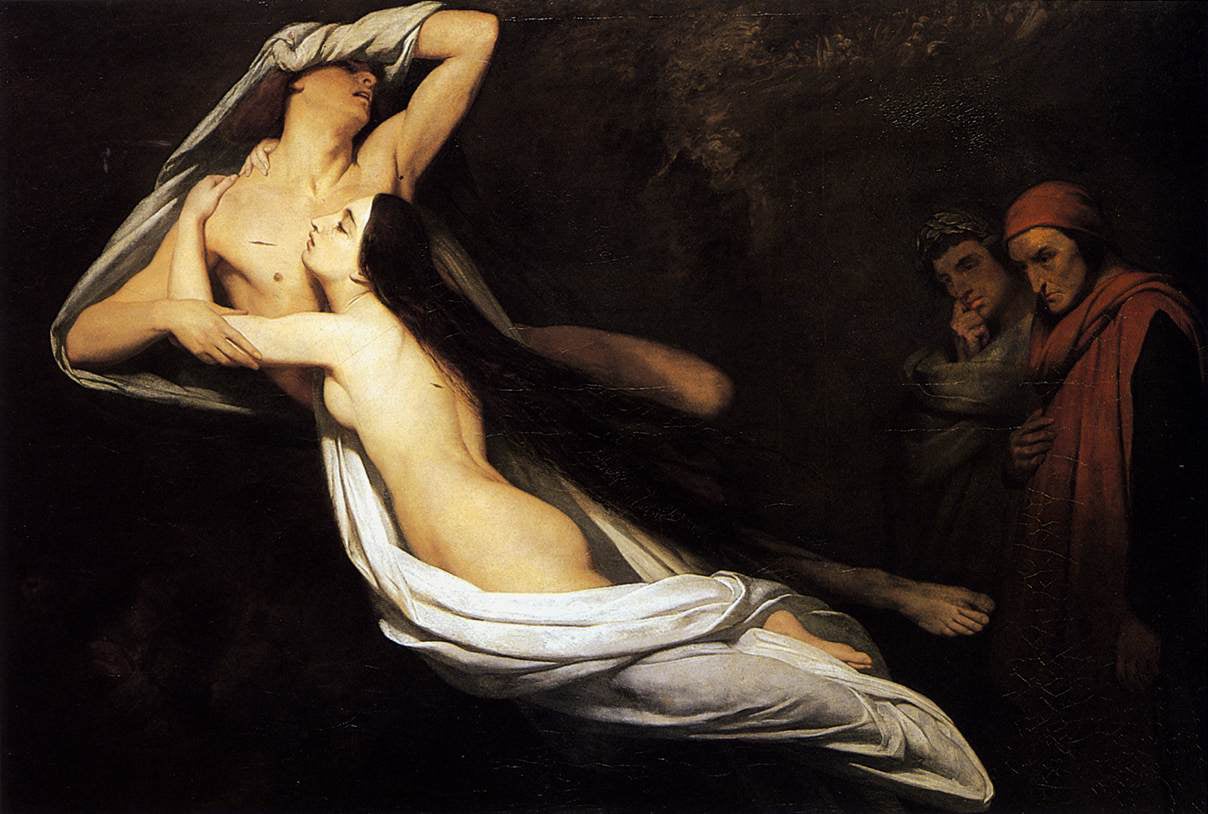
And thereby hangs a tale. The damnation of these last two has puzzled generations. It has very little to do with theology or Christian notions of sin and a great deal to do with Dante’s growing sense that the world gone awry could only be brought back to order and peace by a resurgence of the Roman Empire under a single emperor. A wiser, more holy, more peaceful and more just empire, for sure. Think of it as a sort of European superstate, which would benignly keep in check through the implementation of just laws all those corrupt city oligarchs and vicious tyrants who plagued Dante’s world at the turn of the 14th century.
It’s Dante’s most robust and surprising political vision. Brutus and Cassius are punished not for the betrayal of Caesar as much as for betraying the idea of universal peace, and like all betrayers they are cast into the deepest hole of hell because they sought to overturn that vision for short-term gain. Had he known of them, Dante would have placed Adolf Hitler, Joseph Stalin, Pol Pot and Chairman Mao there too. It’s not difficult to imagine Donald Trump squirming in the devil’s teeth, or Vladimir Putin, or Viktor Orban or any number of the legions of self-serving populist politicians of today.
But having found their way to the bottom of the pit, how were Dante and Virgil to escape? By negotiating the very vast and very hairy body of the devil, about half-way down, just past Satan’s privates, Dante experiences a disorientating sensation whereby he thinks he’s climbing down only to find himself climbing up. He’s now passed from the northern to the southern hemisphere and is on the threshold of the mountain of purgatory itself.
Journeyed, heading toward the world of light;
And caring nothing for rest we climbed
He first and I following a feeble second,
Until I could see the lovely face of heaven
Just through the limits of a narrow hole,
And passing through, once more I saw the stars.
Broken promises
In May 1310, the recently elected “King of the Germans”, Henry of Luxembourg, entered Italy to claim his right to the Imperial crown of the Holy Roman Empire. Dante would hail his arrival as a new dawn of possibilities. Henry, who would reign as Emperor Henry VII, was compassionate and just, brave and idealistic, everything, in short, that Dante so hoped for in his philosopher king. He decreed that he would reconcile conflicting parties, namely the Guelphs and Ghibellines, and restore exiles to their native towns and cities. He would enact the rule of law in every corner of the empire. Dante was, understandably, delirious.
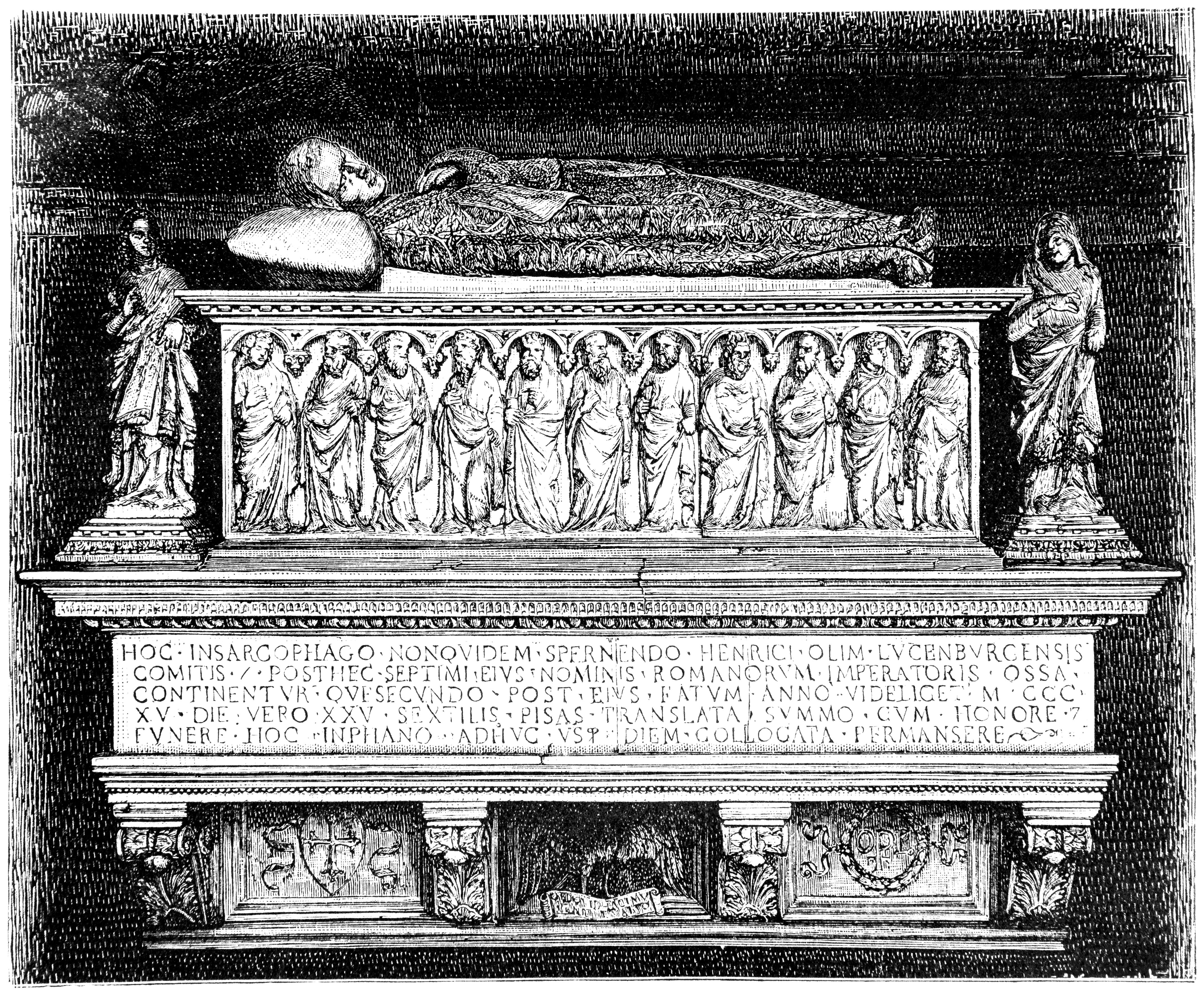
It was all too good to be true. By now the papacy had been dragged off to Avignon by the French king and showed no intention of opposing Henry’s election. Florence, however, did and drew about her a group of other disaffected city states to reject his candidacy.
Dante did his bit for the universal empire, writing letters and political treatises on the virtues of just secular power. For nearly two years Henry tried to be the good emperor, beginning the long process of pacification and reconciliation, but in August 1313 the emperor fell ill – some say of malaria, others that he was poisoned by Florentine agents – and died a little later outside Siena. Whatever the motive, the outcome was the same. Dante’s hopes of a new empire of peace and justice were dashed.
The sun rises and sets.
And so Dante returned to his great poem. He begins his literary climb along the steep slopes of the mountain of purgatory, still with Virgil as his guide, still a living human among the souls of the dead who marvel at the shadow he casts on the ground and long for news of the world of the living. Dante, more chastened, less pride-filled, more philosophical, less angry. Emperor Henry could play no part in the Divine Comedy. He was still very much alive in 1300 when the poem is set. But his spirit haunts the pages of Purgatorio, the second book of the trilogy. All those who have done wrong but repented, those who’ve tried to make a better world and failed, those who’s belief was not strong enough are celebrated here: they are the Angela Merkels, the Emmanuel Macrons, the Tony Blairs – although he has many sins to atone for – and Gordon Browns of our own times. All those who strive a little way towards the good. All those who aren’t quite good enough.
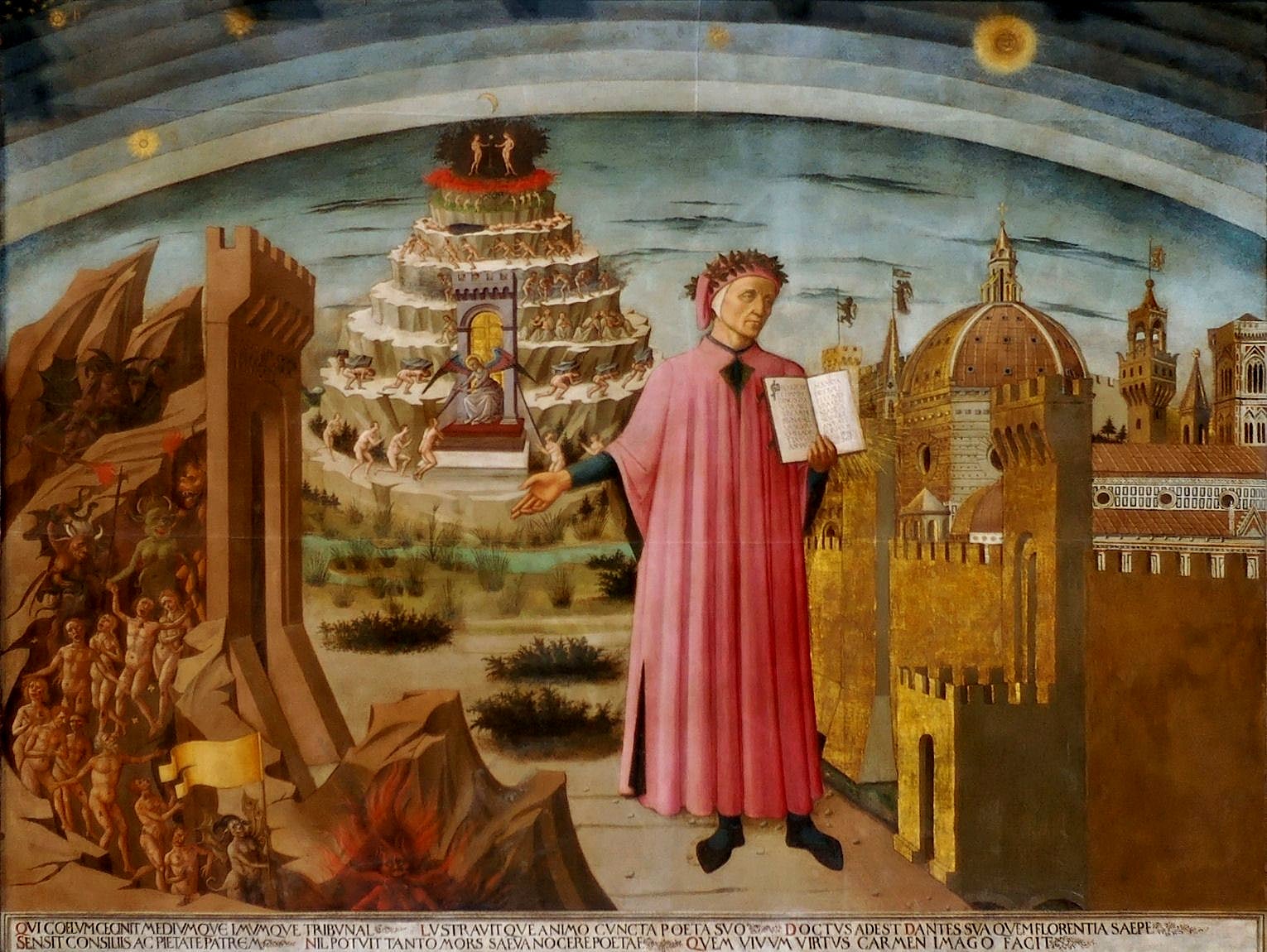
There are no enemies here for Dante, other than honourable ones. The beautiful, blond Manfred of Sicily, who defied the excommunication of a pope in his love of the empire to climb the mountain of purgatory receives only sympathy. And the Mantuan poet Sordello, much admired by Dante, who laments the state of Italy, riven by feuding families such as the Montagues and Capulets – yes, them! – and the unbridled greed of the church. All this prompts Dante into one of his most sarcastic diatribes against the city of his birth:
Before they’re threadbare. Party-coloured town!
How often have you changed your laws,
Your money, your offices and all your customs?
Thrown out good men, or brought them back
Depending on the whim of who’s in charge?
It’s the chaotic nature of such political opportunism that Dante despises the most. There is no continuity, so there is no peace. Some might interpret this as a plea for the most rigid conservatism, but Dante doesn’t demand order for its own sake. He wants the order of good and just laws, permanent laws, and, through them, happiness.
When he reaches the very top of the mountain, which contains the earthly paradise of Eden, he is the first living human to walk there since Adam and Eve. And here he encounters Beatrice again, the girl who’d caused his heart to race and the blood to rush to his head, transformed into something perfect, angelic, wisdom filled:
Could only tremble in her presence,
Put off its speechless heartbreak,
No longer needing the evidence of eyes,
By a secret power all her own,
Felt once more that old and mighty love.
Paradise
The vision of paradise which Beatrice now shows to Dante, over 33 cantos, is the least read part of the Divine Comedy. It’s difficult and obscure in places. The poet shows off his wide reading of philosophy and theology from Aristotle to Saint Thomas Aquinas via Saint Augustine. It’s full of quarrelsome saints and beatific ladies. At times Dante the character, who is quite distinct from Dante the poet, forgets where he is and has saintly men and women rail against his enemies on his behalf.
But first Dante must say goodbye to his old guide, Virgil. Virgil can no longer speak in the earthly paradise. He lingers for a while, until Beatrice, who first summoned him from limbo, takes the poet into her care. Dante turns back to his friend, confessing his old feelings and quoting his master’s own lines from The Aeneid, “I recognise the embers of an old flame”.
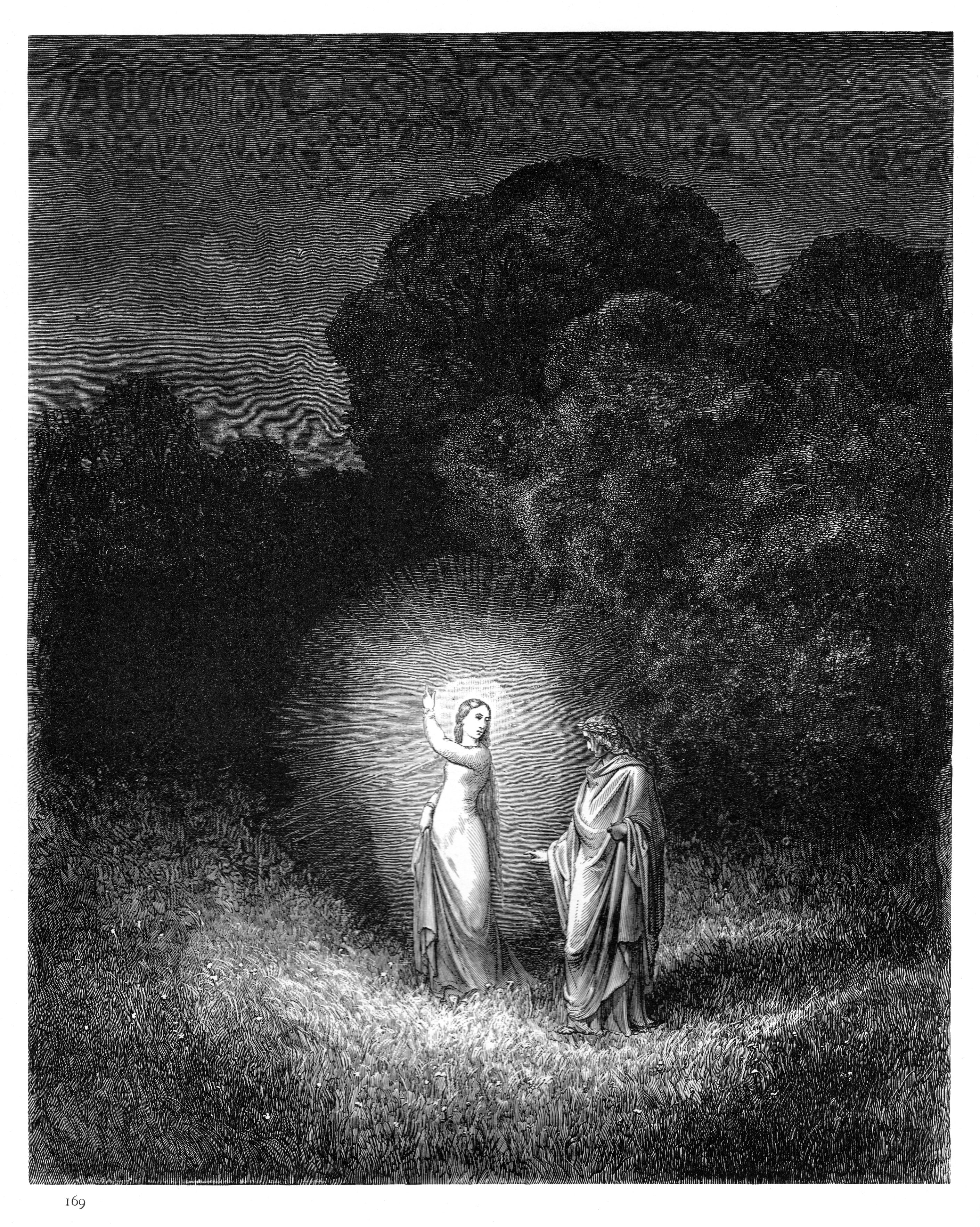
But Virgil has gone. And for much of the rest of the canto Dante is inconsolably miserable. It seems they have travelled long together and encountered so many dangers, so many adventures: Virgil the apologist for the old Roman Empire, the prophet of the birth of Christ, the enemy of chaos and the friend of peace. It’s like he’s lost a lover. But Dante the pilgrim, in the new republic of love, has no need of an old Roman poet.
Dante wrote much of Paradiso in Ravenna to where he’d moved in 1318 at the invitation of its prince Guido da Polenta, the nephew of Francesca da Rimini. He was given a house and an income. His sons and a daughter were able to join him there and he would have the time and space to ruminate on his misfortunes and conjure images of heavenly beauty from his swarming brain. It was a sort of contentment, although it was not home and never could be. As his ancestor, the crusader Cacciaguida degli Elisei, whom he encounters in one of the spheres of heaven, tells him:
And dear to you; that arrow is the first
Loosed from the bow of exile’s bitter wood.
You’ll learn how salty is another’s bread,
How hard it is to climb and then descend
The staircase of another’s house.
But Dante, newly secure in Ravenna, comfortable for once if not actually prosperous, gives himself the best advice he can: publish and be damned, write the truth, however much it may enrage or hurt the fraudsters and charlatans:
Make manifest the wholeness of your vision;
And let them scratch whoever has an itch.
Just as Virgil must abandon him and go back to limbo, so Beatrice, having guided him through all the manifold heavens of paradise gradually taking on the persona of the embodiment of wisdom herself, must return to her place in the great rose of the Empyrean. Dante is left to contemplate the ineffable on his own. Remember that God in the modern world is the right side of history and you will understand and appreciate, not just the exquisite poetry of these cantos, but what paradise represents.
It is a vision of total harmony, concentric circles within circles, sublime mathematics, a light so blinding you must abandon your conventional senses to see beyond it. The great “petals” of the heavenly rose open in continual beautiful motion, each denizen of heaven knowing and glorying in their place, the whole bound by love. It’s a vision you may have already seen in countless books and films where the protagonists find themselves in some version of a heavenly realm. But it’s also a vision of the ideal empire, a vision that goes beyond Dante’s mortal mind to comprehend. He can only feel it.
But still my will and my desire revolved,
Just like a wheel that’s effortlessly turned
By love which moves the sun and all the other stars.
Dante’s return to earth
This vision of unity and harmony was to remain just that, a memory, beyond the sensual, real world. In 1321 a brittle peace was shattered in Ravenna by a military threat from Venice. Guido da Polenta needed trustworthy and experienced ambassadors to go to the Doge (chief of state) to smooth things over. Whether Dante volunteered or was asked, he certainly agreed to join the mission.
Before leaving, however, he placed the last 13 cantos of Paradiso, which he’d not had time to make copies of, in a locked cupboard for safe keeping. The ambassadors travelled by sea to Venice where they were able to negotiate a peace with the republic. Dante made the decision to return to Ravenna by land, through swampy lagoons and sweetly smelling pine forests. But in the process, he contracted malaria – just as his old friend Guido Cavalcanti had in his place of exile. By the time he returned to his little house in Ravenna he was in a bad way, feverish, wracked by pain, his poor prematurely old and malnourished body weaker and weaker. Then, in the early hours of Sunday 14 September, Dante died. He was 56.
He was buried in the Franciscan church of San Pier Maggiore in Ravenna. A marble tomb was erected over a century and a half later with an inscription by a contemporary and friend of Dante, Bernardo Canaccio. It reads simply in Latin, “Florence, mother of little love”.
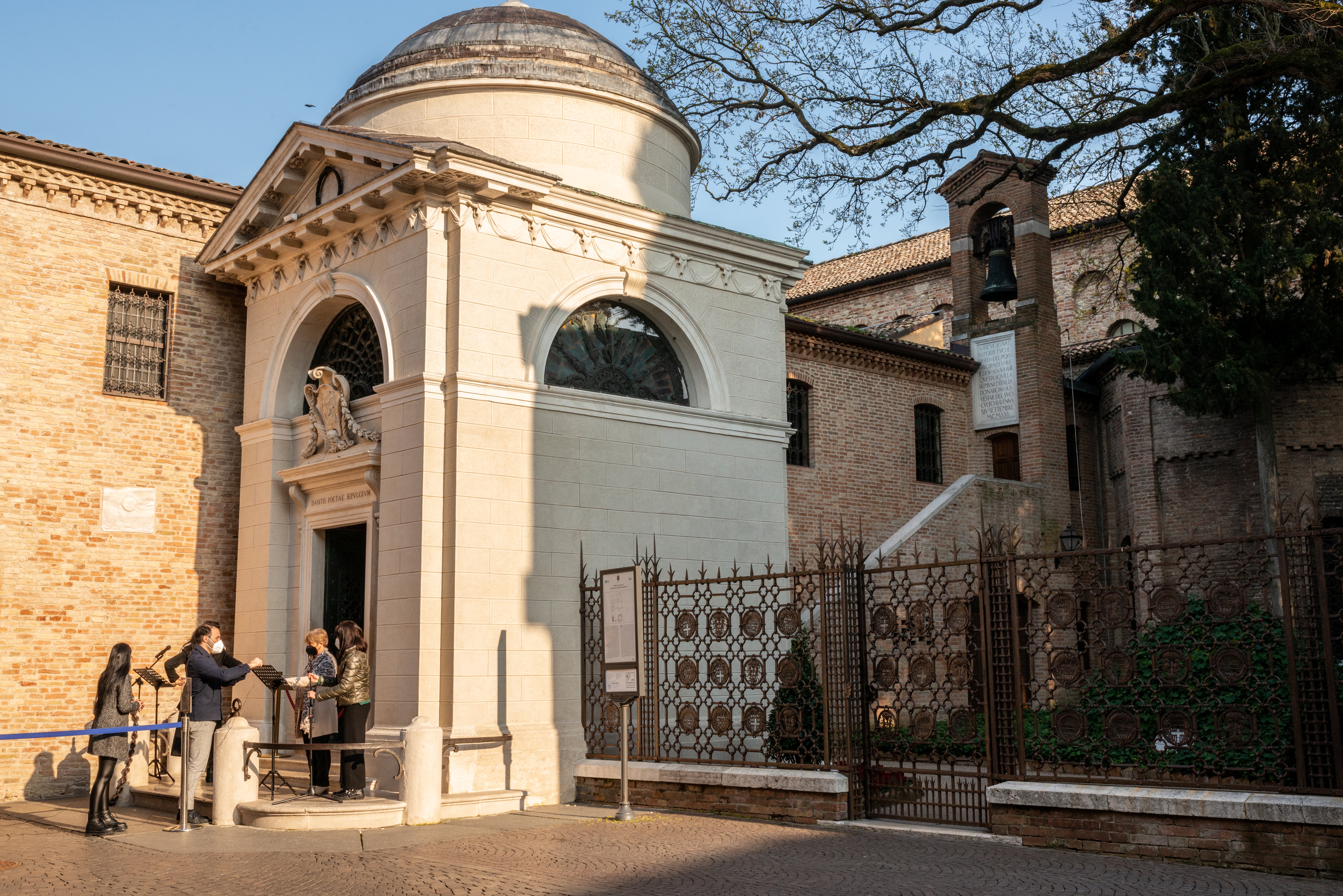
That Dante would have leapt at the opportunity to return to Florence seems little in doubt. Bologna, Verona, Ravenna had been good to him, but he’d always been rootless and restless. The authorities in Bologna, for example, eventually gave into threats from Florence and agreed to expel the White exiles from their walls. And in cities like Verona or Ravenna, rulers came and went, as did their patronage.
The fact of Dante’s inclusion in the fresco of paradise in the Bargello chapel, however, indicates a move not long after his death to rehabilitate the poet in his native city. And a little later, Boccaccio would champion him and his poetry. His greatest work had already been published by then, but not without some trouble on the part of his sons, Pietro and Jacopo. When they decided to put all his papers together to create a single manuscript, they couldn’t find the final 13 cantos of Paradiso. But surely he’d written them? Enquiries were made, and their friends suggested that they should try to finish the poem themselves. All those visionary dreams of their father, the image of the hosts of paradise and the trinity barely transcribed in words, the longing for unity and peace on Earth as it appeared in heaven, would have been lost. Boccaccio instead picks up the story.
In despair, and after eight months of searching, Jacopo one night had a dream in which his father appeared and told him where to find the final cantos of the Comedy. When he woke and went to the place, and lo and behold there were several mildewy sheafs of manuscript hidden in a cupboard just where Dante had left them. I hope the story’s true. It gives a sense of urgency and trepidation to the final months in the birth of the Divine Comedy. And if it isn’t, it should be.
It was supposed that Dante’s remains were left undisturbed after his burial in the tomb built for them. But in 1865 a mason working on the fabric of the old Franciscan church found a box behind a wall containing bones with a helpful inscription saying they were indeed the remains of Dante hidden there in 1677 to keep them safe from Florentine thieves. For centuries, his homeland had been demanding that Ravenna return his corpse to them. As it was the 600th anniversary of his birth in 1865, the bones were re-interred in his tomb with great ceremony and pomp, processions, white veils and crystal urns.
The scene was witnessed by the English critic and aesthete Walter Pater, travelling through Italy with a companion at the time. It put him in mind of the old veneration of saints, only now, in a modern world which no longer believed in such intercessions and had replaced the saintly with the secular, the memory of old things lingered on in new rituals. Dante, the visionary writer of hell and paradise had become a new source of belief, not just for the novel Kingdom of Italy, which would adopt his language – Tuscan – as its own official tongue, but for millions across the world who had read and would read his words.
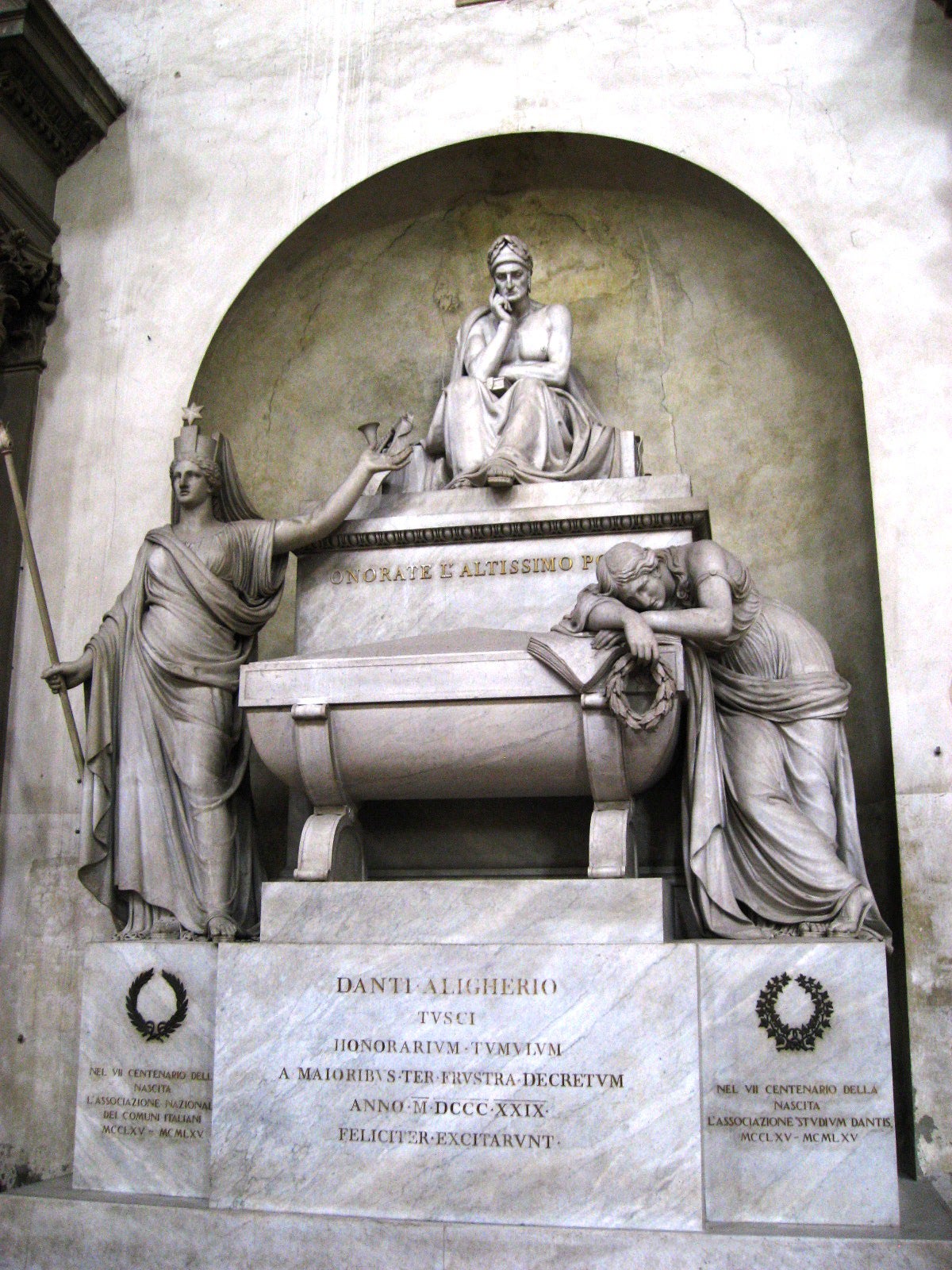
Dante remains stalwartly in exile in Ravenna, despite the wishes of the Florentines and the grandiose neoclassical tomb constructed for him in Santa Croce in 1829. Outside that church stands a statue of him, a giant now, chin in hand, wrapped in a voluminous cloak, glaring out at the city that had rejected him. He seems to have woken from a dream, a little shocked to find himself back among the bustle of modern-day Florence, incredulous that everything he wrote, all the warnings and predictions, the passionate conviction that happiness comes through unity, has been forgotten. However many times his book is read, in countries and languages he could never have imagined, greed and treachery still poison that dream of peace. But the essence of what he wrote remains, like a colour that runs in a warm wash tub or the scent of flowers on a breeze. And he furrows his brow, trying to remember what it was that was so important he had spent so many years of his life trying to say it:
Only the impression of a passionate dream
And everything else just slips the mind,
So am I, so much of my vision gone,
And yet still my heart distils
The sweetness that was born there.
Just as the snow melts in the sun;
Just as the thoughts of the wise woman
Written on leaves are lost on the wind.
This long read is dedicated to my husband Jonathan Cooper, who often contributed to The Independent and who died suddenly on 18 September 2021




Join our commenting forum
Join thought-provoking conversations, follow other Independent readers and see their replies
Comments